‘Rise, Roar, Revolt’: The Phenomenon that Stunned the World of Cinema
Is the Tollywood movie even worth your time, though?
provided by Pen Studios and Lyca Productions
The award-winning blockbuster film, “Rise, Roar, Revolt” (2022) is a spectacle that will leave you flabbergasted as you peek into the world of Indian cinema.
April 21, 2023
Dust spirals around you, the commanding clunk of your shoes echoing as you face away from your inevitable fate. The British Raj is staring down at you, his sharp focus burning into your mind, his actions encouraged by his wife. The crowd watches on, staring with wide eyes as you take your helmet off, handing it to the nearest police officer. Your stomach twists. He doesn’t know. He doesn’t know why I’m doing this. Your right hand is clammy, but you ignore it, resorting to tightening your grip on the whip. You can’t show fear on your face. You can’t show emotion. You can’t show pain. Every single glimpse will be used against you, a reason for someone else to do the same to you. To do what they’re doing to him. The action you’re about to do. It’s time. You swirl around, and before you know it, you’ve lifted the whip into the air, the skin-breaking tail of it shining in the light. A cry. A splatter.
You just whipped your best friend.
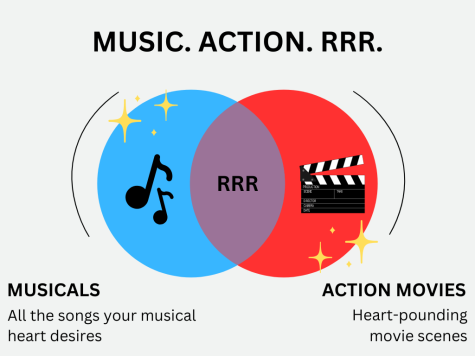
This is merely a watered-down description of the emotions viewers grapple with as they watch the blockbuster Tollywood movie, RRR (standing for “Rise, Roar, Revolt”). No, not Bollywood. Tollywood. It’s not a typo, I promise. In order to understand RRR, it’s important to understand the basics of Indian cinema, starting with the fact that India is home to many languages. Some examples of these (other than Hindi) are Tamil – my mother tongue – and Telugu. Simply put, Tollywood is Telugu movies, the language RRR is originally in, no matter what Netflix is trying to say by only having Hindi as an option.
Keep that in mind: Tollywood. Telugu. Not Bollywood. Not Hindi.
Now that that’s out of the way, it’s important to tackle an essential question that’s been asked: “Is it worth the hype?” In one word: YES. From its gut-wrenching emotion to its detailed symbolism, the story resonates with every single person who comes across it, especially me, as someone who values those qualities in film.
RRR’s story has it all: two best friends who would quite literally die for one another, people in high ends of power that you want to punch in the face, the dramatic backstory that makes you feel a bit like a jerk for complaining about your life, lovers since childhood whose names are made for each other, striking historical elements to teach you more, and a homemade cosplay that puts Spiderman to shame. Sorry, MCU. You’ve met your match.
The story follows two men in the 1920s, during a time when India was under British rule. One is a police officer under the Empire, doing everything he can to be promoted to the position of Special Officer. The other is a protector of the Gond Tribe, from which a child was forcibly taken by the British not long ago. Ram, the police officer, is given the task to find and arrest Bheem, the Gond Tribe protector, who is undercover in the city, and if he succeeds, he will be offered the position he so desperately wants. Stars align, planets meet, and Ram and Bheem’s paths cross and they end up becoming… best friends. Brothers. Proof that platonic soulmates truly do exist. The story follows the growth of their friendship, the Indian fight for freedom, as well as what happens when both of their true identities are brought to light.
The intense plot only adds on to the emotion embodied in this movie. As someone who values the waves of emotions that slam into me as I watch a movie, RRR stuck out to me in that aspect. Even after watching, the things I learned from it stayed with me. At the time, I assumed it was because of my Indian ethnicity, therefore every action, every injustice, stuck me deeply and personally. However, after reading about how others felt as they watched, I now know that that wasn’t the case at all. The violent treatment was felt by everyone who watched… they connected personally, as a human being. RRR battles arguments regarding freedom, bravery, and true friendship in a beautiful way, leaving the theater awed, while simultaneously burning with an inner, indescribable fire.
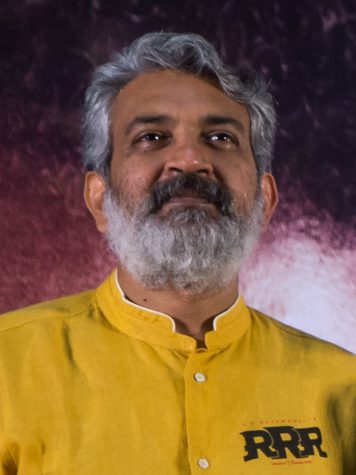
All of this, and I haven’t even described the use of symbolism throughout RRR. S. S. Rajamouli, the director, along with V. Vijayendra Prasad, the writer and Rajamouli’s father, perfectly crafted the use of symbolism throughout the movie in such a way that it takes the audience’s breath away. For example, a clear view of this is through the recurring presence of fire and water, representing Ram and Bheem respectively. In my perspective, I believe this is to show that the both of them balance each other out, and if pitted against each other, will cancel themselves out in the process. This is also an illustration of how neither is stronger than the other.
Another duology created by Rajamouli are the blockbusters Baahubali and Baahubali 2. When it comes down to it, after watching RRR, I recognized that the movie hit a level I thought could never be reached, the same level as both of the Baahubali movies. While Baahubali takes place in the imaginary kingdom of Mahishmati, and is a complete fiction, RRR takes place during a specific time period in India, in Delhi, and is a historical fiction imagining what would have happened if two real-life Indian freedom fighters had crossed paths. However, both masterpieces delve into deep topics of family, loyalty, love and friendship, all while carrying an aura of show-stopping action.
A similar great comparison, that American audiences may be more familiar with, are the Avengers movies. While the MCU lacks the glamorous dance numbers, one thing that it shares with RRR is its jam-packed action. The best way to summarize it is this, as I said after I saw RRR, “RRR has the emotion, plot, and action in all of the Avengers movies, all within three hours.” Ram shows traces of the fan-favorite Steve Rogers (Captain America) with his righteous nature, while Bheem often reminded me of Peter Parker (Spiderman) as he carries his clueless, lovable, but strong personality. This just proves how both high-grossing movies match one another in both the history books, characters, plot, and more.
Speaking of the highest grossing movies… it’s important to recognize the countless number of awards RRR has been bestowed with as well. It was a nominee for the Golden Globe for Best Motion Picture in the Non-English category, and one of the songs Naatu Naatu won the Golden Globe for Best Original Song. Not to mention, RRR made history as the first Indian Feature film to win an Oscar, taking home the trophy with Naatu Naatu winning Best Original Song. The song was even honored with a performance, complete with a dance number!
RRR is a movie that no matter the time, day, or week, I could talk about for hours on end. However, beneath its glamorous wallpaper moments and heart-clenching scenes, Rajamouli’s movie unpacks the much heavier topics of colonization, family separation, racism, and how evil can exist in many forms. It openly explores an essential question: What does it mean to be free? In the process, RRR also provides us answers in the form of life lessons. For these reasons, all I can say is that this movie definitely deserves 5/5 stars, if not more. It not only met, but exceeded expectations.
A spectacle that will leave you flabbergasted, especially if it is your first glimpse into Indian cinema – RRR is a must-watch. You will watch as fate wrestles with friendship, and stare stunned as it all comes down in a waterfall of flames.
RRR will show you what it truly means to:
Rise.
Roar.
Revolt.
Note: Please keep in mind that RRR has a rating of MA on Netflix, mainly due to the violence shown in the movie.


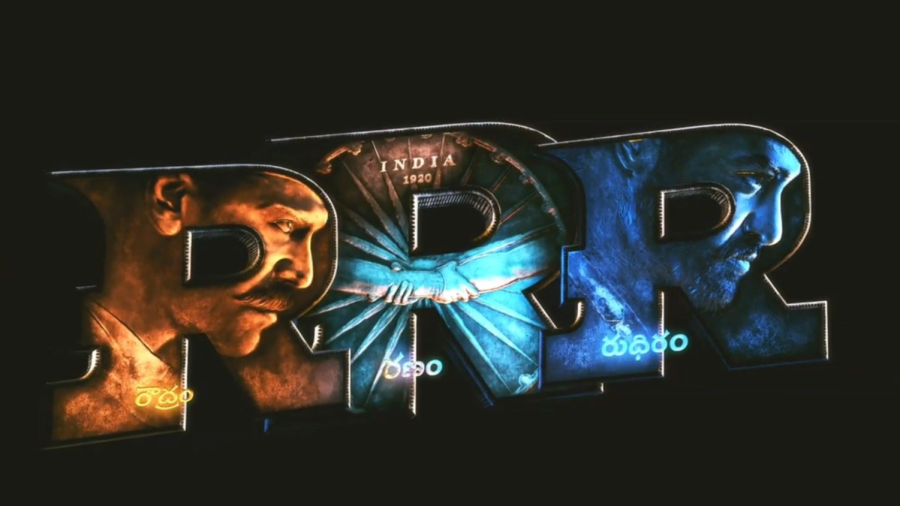

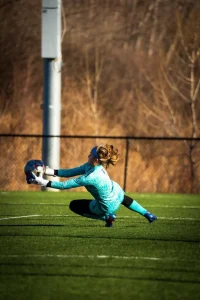

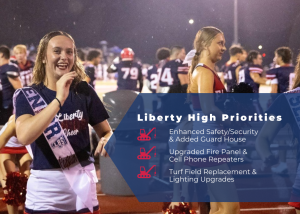


raksha | Apr 21, 2023 at 5:09 pm
omg you’re slaying frfr